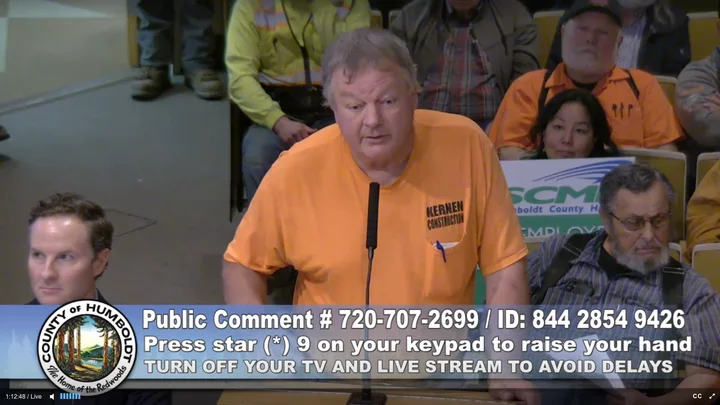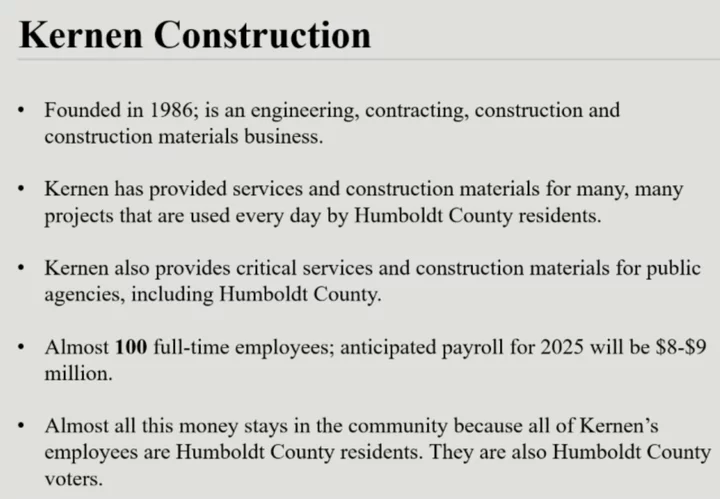Kernen cofounder Scott Farley addresses the board. Screenshot.
###
PREVIOUSLY:
###
The latest skirmish over rock and gravel operations at Kernen Construction’s Glendale yard ended with a win for the construction company this afternoon.
After a three-hour hearing this morning – and several delays from previous meetings over the last few months — the Humboldt County Board of Supervisors voted 4-1 in favor of a stripped-down motion that required the company to remediate some unpermitted berm construction at the site, which had encroached on the coho-bearing Noisy Creek.
But in the end the board majority seemed to side with representatives of the company, who argued that the board had no standing to revoke or amend a decades-old conditional use permit, which contained no language limiting the company’s hours of operation or the noise generated by it.
Supervisor Steve Madrone, who represents the area on the board, was the sole “no” vote on the the board’s compromise, and issued a strong verbal dissent right before the vote was taken. The terms being approved by the board would continue to allow 24/7 work at the Glendale site, and with no mechanism for limiting noise pollution.
“I just want to be really clear,” Madrone said. “I will be voting no, and I don’t believe that this motion in front of us deals with the number one reason why we’re even here today. And I find that to be just outrageous, frankly, that we’re not dealing with this. We’re not trying to find a way to really find a compromise for this neighborhood, you know, to bring some peace to them, to allow them to have their sleep and things like that.”
As was illustrated during public testimony, the dispute between Kernen and some of its nearest neighbors is a classic zoning case: How to balance the needs of the industrial company with the rights of the people who live nearby?
The original resolution brought by staff came in pretty hard in favor of a revised conditional use permit that would limit operations at the yard, which most people seem to agree leaped up abruptly in the last couple of years. Among other things, staff’s proposed “Revised Conditions of Approval” would have mandated that all operations cease nights and on Sundays. (The loudest part of the Kernen operation — rock crushing — is already so limited.)
Planning Director John Ford said that this proposed condition was prompted by the fact that Kernen had failed to negotiate with the department or neighbors on those terms.
“I don’t think staff wants to see them have to shut down at night completely but we’d ask for them to give us a proposal,” Ford said. “How can we balance this a little bit and address some of the neighbors’ concerns? We haven’t gotten a proposal, so this is our effort to come out and and have a dialogue about what can be done to realistically try to address some of the noise concerns that exist out there.”
Caltrans and other road contractors are often limited to working at night, so trips to Kernen’s materials yard will have to take place during those hours. In addition, sometimes emergency work will require that Kernen open its stockpiles of asphalt, gravel and the like during off hours.
Kernen attorney Brad Johnson, who led the case before the board, came out very strong, arguing that the board had no legal right to modify aspects of the permit issued to the company at the turn of the century. He explicitly mentioned legal action if it were to attempt to do so, and even hinted at political consequences to board members in a PowerPoint slide:
Slide from Johnson’s PowerPoint presentation.
Public testimony was mixed, with many people arguing that when you by a house in an industrial area you shouldn’t complain about the consequences.
“I live in a flight path for the airport in McKinleyville,” said John Nicholls of Nicholls Trucking, also located in Glendale. “I knew when I moved there that it was going to be noisy. Planes come over all the time. I hear them. It is what it is. That’s where I chose to live. You know, I can’t do anything about it. Ninety percent, probably 99 percent of the people who have complaints about the noise coming up from there have moved in since this operation was in place. They have no business complaining about the noise that they chose to move next to.”
But neighbors who have been lobbying the county about increased activity in recent years took exception to such sentiments, among them Cindy Trobitz-Thomas.
“The Trobitz family, contrary to what people think, that we’re all new there, has lived in Glendale for nearly 70 years, for the most part in harmony with adjacent industrial uses until the last two years,” she said. “Kernen Construction has expanded their operations without regard to the current situation for residents, the environment and laws.”
When it came time to take action, Supervisor Steve Madrone offered a resolution that asked for everything the Planning Department had proposed, in terms of hours of operation, noise and environment remediation, and added a few other items of concern — dust management, for example.
“I’m trying to find a way forward where we can continue to have this business operate, but also make it a little less impactful on the neighborhood,” Madrone said.
But this motion died for lack of a second, apparently because other supervisors took the point that amending the conditions of Kernen’s original conditional use permit — at least regarding noise impacts to the neighborhood — would not pass legal scrutiny, at this point.
Supervisor Natalie Arroyo asked the Kernen team which items from the county’s proposed list would they be comfortable with, and after a short break Johnson answered that question. The biggest concession was on the unpermitted berm the company had constructed, in an attempt to keep out flood waters. The company would agree to move that berm back 25 feet, away from Noisy Creek, and to revegetate that area. But it was a firm “no” on most items relating to sound or hours of operation.
One concession Kernen did make on the noise front: It agreed to replace the backup alarms on all its yard equipment with new, more mellow “white noise” alarms, or “quackers,” as Madrone called them. The compromise resolution passed by the board gave the company a year to do so.
The company also agreed that if it conducts vehicle maintenence at night, as it tends to do, it will do so indoors and with the doors closed.
So Ford quickly drafted a revised version of the resolution with those changes reflected, and it quickly passed with all but Madrone voting in favor.
The board is in closed session at the time of this writing. When it comes back, it will talk about the future of Project Trellis, the county-funded and -led marketing program meant to support the cannabis industry. It’ll also pass a resolution confirming that members of the board will receive no pay raises this year, in light of the budget crunch.


CLICK TO MANAGE